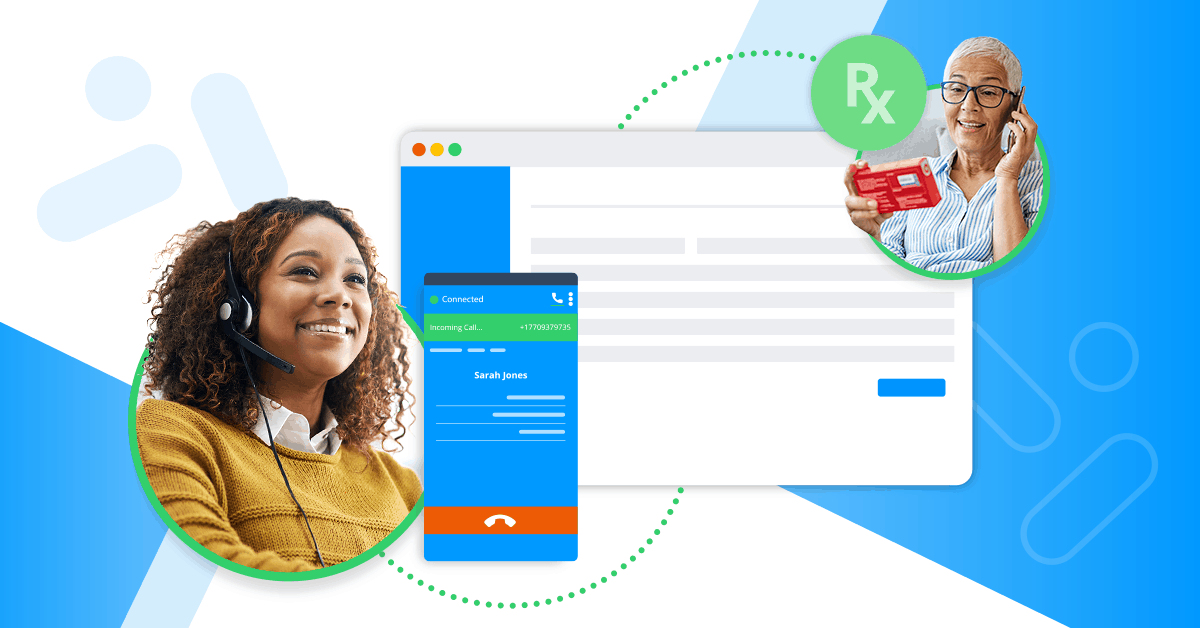7 Pharmaceutical Contact Center Programs to Improve Your Clinical Trial Success Rate

The development of new therapies is exciting, but also arduous. Organizing clinical trials to bring a therapy to market involves a lot of work. From recruiting participants, screening them, ensuring their compliance, and gathering accurate information about their experience- there’s a great deal of steps involved in the process. It’s no wonder 85% of clinical trials experience delays. Those delays cost anywhere from $600,000 to $8 million each day.
Furthermore, we’re living in a time when the fragmenting of today’s media means it’s more difficult than ever to gain and sustain the attention of any given target audience. It’s a perfect storm of events that requires Pharma to evolve its methods from traditional outreach and audience curation to tech-savvy operations that harness the efficiencies of today’s call center operations.
VoIP services can help create a positive environment that leaves clinical trial participants feeling important and safe. Read on for seven pharmaceutical programs that can improve your clinical trial success rate from recruitment to reporting.
7 Reasons to Use Contact Center Programs for Your Next Clinical Trial
1. More efficient inbound/outbound clinical trial recruitment
To start your trial, you must have participants. And not just willing participants, but qualified ones! Call center services can help your organization fulfill your participant minimums quickly. A call center can scale up or down the number of agents working to secure a trial depending on the response.
It’s standard practice to use a toll-free number for inbound calls originating from print or online advertisements. Toll-free numbers are a cost-effective way for you to engage potential participants at no cost to them.
Plus, you can also use local numbers to increase your outbound recruitment rates. Local numbers are those that begin with an area code local to the geographic areas from which you need to recruit clinical trial participants. Software Advice's research suggests that people are four times more likely to answer a call from a local phone number than a toll-free number because they trust someone who shares their geographic background over someone who has no local connection. At AVOXI, our internal research has seen this go as high as 10x with AVOXI TrueLocal. Why? Because when people assume they’re speaking with someone who is local to them they will trust the offer they receive from that person more.
When working with a VoIP provider to make calls using local presence, you’ll gain access to quality call services backed up by multiple server locations and extensive backup systems. VoIP offers increased call quality and stability over analog systems. If you’re running call operations in multiple countries, choosing a VoIP service with local presence dialing is a more stable choice than contracting with local carriers and relying upon the PSTN.
Local numbers usually cost more to use than toll-free numbers. But the ease of using numerous local numbers through a single carrier and the trust their use engenders among your potential participant pool is well worth the investment.
2. Faster Scheduling
Once you’ve selected participants, help them set up in-person or virtual appointments using auto-attendant services to triage different types of participants to the correct appointment slots. Auto-attendant features let participants access your study 24/7 and create their schedules at a time convenient for them.
Cloud-based VoIPs also offer call routing if your clinical trial is complex enough that participants should speak to a live person when making appointments. Route participants to the team member best suited to answer questions, conduct final screenings, and guide them through the next steps using intelligent call routing. Your staff will be able to reduce handle time and increase their first-time call resolution rate.
3. Enhance participant follow-up and compliance
Jennifer Richard, director of call center operations at McKesson, notes that a contact center is an ideal way to offer support for patients who have questions about their therapy beyond the information they’ve already found online. Contact centers can offer patient support in the form of:
- Adherence calls
- Co-pay card program support
- Patient assistance programs
- Behavior and lifestyle support
A contact center offers connection with a human for a two-way conversation about managing their clinical trial participation. Contact center agents can learn the purpose and goals of your clinical trial as well as what behaviors the patient should be adhering to for the benefit of the study. If a patient isn’t complying with the trial guidelines, or if they need more guidance to stay compliant, a contact center agent can use personalized, empathetic messaging to re-center their actions and support their meaningful participation.
As we’ve mentioned before, time is money when it comes to clinical trials - and a cloud-based tool that helps stem the millions trial delays cost pharma companies is worth the investment. Many VoIP providers offer a comprehensive list of integrations from their software to popular CRM, chat, and help desk platforms. These integrations let your staff instantly pull up information about a participant and their history with your clinical trial while talking with them. A 360-degree look at the participant can help your staff better understand a patient’s reasons for calling and help both parties quickly reach an acceptable solution in the participant’s best interest.
4. Resolve trial complaints
In addition to providing supplemental information as participants navigate a clinical trial, cloud-based call center services can also log and report on complaints about pharmaceutical trials. As agents speak with participants, call center software records their notes as well as the call itself to create a primary account of trial data. Pharma companies can access these recordings later to assess potential drawbacks and areas of improvement to study further.
5. Employ a nurse triage telephone service
If you must provide clinical support for a trial by employing a registered medical professional, pharma companies can use a combination of local numbers, toll-free numbers and automated attendants to funnel inbound calls and assist those professionals as they triage emergencies and provide quick, live support. These services help participants get the medical help they need within the critical window of action while optimizing the participant-organization relationship.
6. Extend your market research
Once a clinical trial concludes, call center services can help health and pharmaceutical brands continue collecting valuable insights about participants and early adopters of a therapy. Your organization can add to or reduce the number of business lines employed during the clinical trial to support further market research activity and field inquiries. Services like SMS messaging can send quick follow-up messages to former trial participants. Inbound and outbound options allow your organization to connect with trial customers based on their preferences, regardless of where they’re located.
7. Create comprehensive, confidential reporting
Remember how your CRM can connect with call center software to assess a participant’s history and offer customized support? Use that connection to pull up-to-the-minute reports about communications your agents make in support of your clinical trials. VoIP-sourced call reports are securely stored in the cloud to ensure patient information stays confidential and your organization remains HIPAA-compliant. You can grant access to targeted teams and individuals, and update that access at any time.
Choosing the Right Program For Your Trial
A clinical trial involves plenty of moving parts, and your organization can’t afford to let any gears become loose or any inputs to fail. When you work with a single organization like AVOXI, you’ll have voice, messaging and contact center software at your fingertips in an all-in-one platform. This makes it easy for you to manage your global communications while staying within-budget trial. There’s no need to work with multiple vendors to cover all the voice, messaging and recording services your trial requires. AVOXI helps pharmaceutical companies conduct efficient clinical trials that make your patients feel cared for.
See How AVOXI Can Help Your Pharmaceutical Programs
Contact an AVOXI representative to explore how our services can equal success for your next clinical trial.


